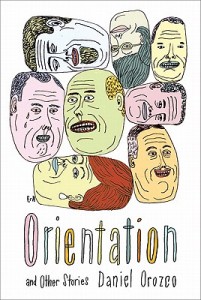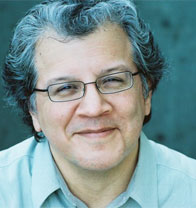 This week’s feature is Orientation, by Daniel Orozco. Published in May by Faber & Faber, this long-awaited and much-anticipated collection is Orozco’s first book. His stories have appeared in such places as Zoetrope: All Story, Ecotone, Harper’s Magazine, McSweeney’s, StoryQuarterly, Mid-American Review, Seattle Review, and Story. In 1995 the title story of this collection was selected for inclusion in The Best American Short Stories, and in 2005 “Officer’s Weep” was anthologized in Best American Mystery Stories. He was a Scowcroft and L’Heureux Fiction Fellow and a Jones Lecturer in Fiction in the Creative Writing Program at Stanford University. He has also been awarded residencies from the MacDowell Colony and the Lannan Foundation, and is the recipient of writing fellowships from the Idaho Commission on the Arts, as well as from the NEA. He teaches in the Department of English at the University of Idaho.
This week’s feature is Orientation, by Daniel Orozco. Published in May by Faber & Faber, this long-awaited and much-anticipated collection is Orozco’s first book. His stories have appeared in such places as Zoetrope: All Story, Ecotone, Harper’s Magazine, McSweeney’s, StoryQuarterly, Mid-American Review, Seattle Review, and Story. In 1995 the title story of this collection was selected for inclusion in The Best American Short Stories, and in 2005 “Officer’s Weep” was anthologized in Best American Mystery Stories. He was a Scowcroft and L’Heureux Fiction Fellow and a Jones Lecturer in Fiction in the Creative Writing Program at Stanford University. He has also been awarded residencies from the MacDowell Colony and the Lannan Foundation, and is the recipient of writing fellowships from the Idaho Commission on the Arts, as well as from the NEA. He teaches in the Department of English at the University of Idaho.
In the opening of his recent review of Orientation, contributing editor J.T. Bushnell captures the sense of excitement that so many readers have felt anticipating the release of this collection. He writes:
If you’re like me, there are books you like and books you love, and then there are books that make you remember where you read them. This book is one of those. The nine stories in Daniel Orozco’s debut, Orientation, are so remarkable, so funny and dark and innovative, so smart and stirring and sad, that they left me pounding the sand on which my girlfriend and I had laid our blanket, muttering, “So good, so good.” We’d made a day trip to the Oregon coast to celebrate an anniversary, but I’ll remember nothing about the trip better than reading this collection.
I have, after all, been waiting for it since 2004. That was when I first came across Orozco’s short fiction in Harper’s Magazine. I was so stunned and moved and entertained that I hustled across the library to a computer, where I found another story of his in the archives of Zoetrope: All-Story. It was electric, mesmerizing. A couple years later I found another one anthologized in a text I was using to teach a fiction-writing course, then a couple years later a new one in a Best American anthology. Each time I was dazzled, and I searched for his book, eager to read more. But there was no book. Not until now.
Happily, Bushnell concludes, the book has been more than worth the wait: “Orientation is, without question and without hyperbole, one of the best books I’ve ever read. I can’t find words emphatic enough that aren’t already printed on its dust jacket, but I can assure you that all the words there are true.”
In addition to this review, we’ve also recently published an interview with Daniel Orozco. At the end of the summer, Rock Bottom author and contributor Michael Shilling talked by phone with Orozco. The two discussed “craft, teaching, and MFA haters,” among other things. Below is an exchange in answer to Shilling’s initial question about the unique structures of many of the stories in Orientation:
Orozco: Every story that I write feels like a kind of experiment. The challenge in crafting a story is how to engage a reader emotionally, intellectually, experientially. I’m always looking for some kind of challenge, some kind of structural or narrative constraint to try and figure out. For “Officers Weep,” it was, Can I tell a story that is written in the form of a police blotter? And in a way the structure determines how the story’s gonna go. So yes, I begin with form and then fill in with character and engagement. Jerome Stern talks about the “shapes of fiction,” and I think that’s a good analogy, because I need a shape for the story and then I start figuring out what’s going to happen in it.
Shilling: That approach is refreshing. I think a lot of writers are afraid of playing with structure because of self-consciousness, these false distinctions between the “realistic” and the “experimental,” and if they play around with structure it’ll be seen as a gimmick. As if a gimmick is always bad.
Orozco: Right! I mean, the story “Orientation” is a gimmick. You can only do it once for a limited amount of pages, and the same goes for “Officers Weep” because I can’t do a series of stories structured as police blotters. But so what? All that matters is that a story, whatever the structure, must be grounded in the humane.
To read Michael Shilling’s complete interview with the author, please click here.

Author photo courtesy U Idaho website
- Don’t miss J.T. Bushnell’s September review of Orientation.
- For more about Daniel Orozco, visit his faculty page on the University of Idaho’s Website for the Department of English.
- Read Orozco’s “I Run Every Day” in the archives of Zoetrope: All-Story.
- You can also win one of three signed copies of this book, which we’ll be giving away next week to three of our Twitter followers.
To be eligible for this giveaway (and all future ones), simply click over to Twitter and “follow” us (@fictionwriters).
To all of you who are already fans, thank you!





